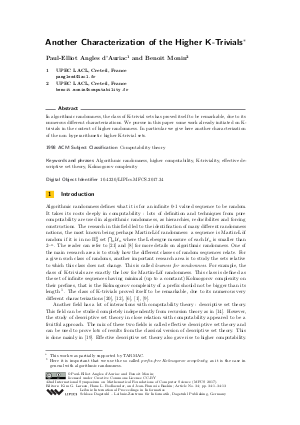Another Characterization of the Higher K-Trivials
Authors Paul-Elliot Anglès d'Auriac, Benoit Monin
-
Part of:
Volume:
42nd International Symposium on Mathematical Foundations of Computer Science (MFCS 2017)
Part of: Series: Leibniz International Proceedings in Informatics (LIPIcs)
Part of: Conference: Mathematical Foundations of Computer Science (MFCS) - License:
 Creative Commons Attribution 3.0 Unported license
Creative Commons Attribution 3.0 Unported license
- Publication Date: 2017-12-01
File

PDF
LIPIcs.MFCS.2017.34.pdf
- Filesize: 499 kB
- 13 pages
Document Identifiers
Subject Classification
Keywords
- Algorithmic randomness
- higher computability
- K-triviality
- effective descriptive set theory
- Kolmogorov complexity
Metrics
- Access Statistics
-
Total Accesses (updated on a weekly basis)
0Document
0Metadata
Abstract
In algorithmic randomness, the class of K-trivial sets has proved itself to be remarkable, due to its numerous different characterizations. We pursue in this paper some work already initiated on K-trivials in the context of higher randomness. In particular we give here another characterization of the non hyperarithmetic higher K-trivial sets.
Cite As Get BibTex
Paul-Elliot Anglès d'Auriac and Benoit Monin. Another Characterization of the Higher K-Trivials. In 42nd International Symposium on Mathematical Foundations of Computer Science (MFCS 2017). Leibniz International Proceedings in Informatics (LIPIcs), Volume 83, pp. 34:1-34:13, Schloss Dagstuhl – Leibniz-Zentrum für Informatik (2017)
https://doi.org/10.4230/LIPIcs.MFCS.2017.34
BibTex
@InProceedings{anglesdauriac_et_al:LIPIcs.MFCS.2017.34,
author = {Angl\`{e}s d'Auriac, Paul-Elliot and Monin, Benoit},
title = {{Another Characterization of the Higher K-Trivials}},
booktitle = {42nd International Symposium on Mathematical Foundations of Computer Science (MFCS 2017)},
pages = {34:1--34:13},
series = {Leibniz International Proceedings in Informatics (LIPIcs)},
ISBN = {978-3-95977-046-0},
ISSN = {1868-8969},
year = {2017},
volume = {83},
editor = {Larsen, Kim G. and Bodlaender, Hans L. and Raskin, Jean-Francois},
publisher = {Schloss Dagstuhl -- Leibniz-Zentrum f{\"u}r Informatik},
address = {Dagstuhl, Germany},
URL = {https://drops.dagstuhl.de/entities/document/10.4230/LIPIcs.MFCS.2017.34},
URN = {urn:nbn:de:0030-drops-80837},
doi = {10.4230/LIPIcs.MFCS.2017.34},
annote = {Keywords: Algorithmic randomness, higher computability, K-triviality, effective descriptive set theory, Kolmogorov complexity}
}
Author Details
References
-
Laurent Bienvenu, Adam R Day, Noam Greenberg, Antonín Kučera, Joseph S Miller, André Nies, and Dan Turetsky. Computing k-trivial sets by incomplete random sets. The Bulletin of Symbolic Logic, 20(01):80-90, 2014.

-
Laurent Bienvenu, Noam Greenberg, and Benoit Monin. Continuous higher randomness.

-
Chi Tat Chong, André Nies, and Liang Yu. Lowness of higher randomness notions. Israel J. Math., 166(1):39-60, 2008.

-
Chi Tat Chong and Liang Yu. Randomness in the higher setting. Submitted.

-
Chi Tat Chong and Liang Yu. Recursion Theory: Computational Aspects of Definability, volume 8. Walter de Gruyter GmbH &Co KG, 2015.

- Adam R. Day and Joseph S. Miller. Cupping with random sets. Proc. Amer. Math. Soc., 142(8):2871-2879, 2014. URL: http://dx.doi.org/10.1090/S0002-9939-2014-11997-6.
- Rod Downey, Andre Nies, Rebecca Weber, and Liang Yu. Lowness and Π⁰₂ nullsets. J. Symbolic Logic, 71(3):1044-1052, 09 2006. URL: http://dx.doi.org/10.2178/jsl/1154698590.
- Rodney G. Downey and Denis R. Hirschfeldt. Algorithmic Randomness and Complexity. Theory and Applications of Computability. Springer, 2010. URL: http://dx.doi.org/10.1007/978-0-387-68441-3.
-
N. Greenberg, J. Miller, B. Monin, and D. Turetsky. Two more characterizations of k-triviality. Notre Dame Journal of Formal Logic, To appear.

-
Noam Greenberg and Benoit Monin. Higher randomness and genericity.

-
Joel David Hamkins and Andy Lewis. Infinite time turing machines. The Journal of Symbolic Logic, 65(02):567-604, 2000.

-
Denis Hirschfeldt, André Nies, and Frank Stephan. Using random sets as oracles. Journal of the London Mathematical Society, 75(3):610-622, 2007.

-
Greg Hjorth and André Nies. Randomness via effective descriptive set theory. Journal of the London Mathematical Society, 75(2):495-508, 2007.

-
Alexander S. Kechris. Classical Descriptive Set Theory. Graduate Texts in Mathematics. Springer New York, 2012.

-
Bjørn Kjos-Hanssen, Joseph S Miller, and Reed Solomon. Lowness notions, measure and domination. Journal of the London Mathematical Society, page jdr072, 2012.

-
Per Martin-Löf. The definition of random sequences. Information and Control, 9:602-619, 1966.

- Per Martin-Löf. On the notion of randomness. Studies in Logic and the Foundations of Mathematics, 60:73-78, 1970. URL: http://dx.doi.org/10.1016/S0049-237X(08)70741-9.
-
Benoit Monin. Higher computability and randomness. PhD thesis, Universite Paris Diderot, 2014.

-
Yiannis Moschovakis. Descriptive Set Theory. Mathematical surveys and monographs. American Mathematical Society, 2009.

-
André Nies. Lowness properties and randomness. Advances in Mathematics, 197(1):274-305, 2005.

-
André Nies. Computability and Randomness. Oxford Logic Guides. Oxford University Press, 2009.

-
Gerald E. Sacks. Higher recursion theory. Perspectives in mathematical logic. Springer-Verlag, 1990.

